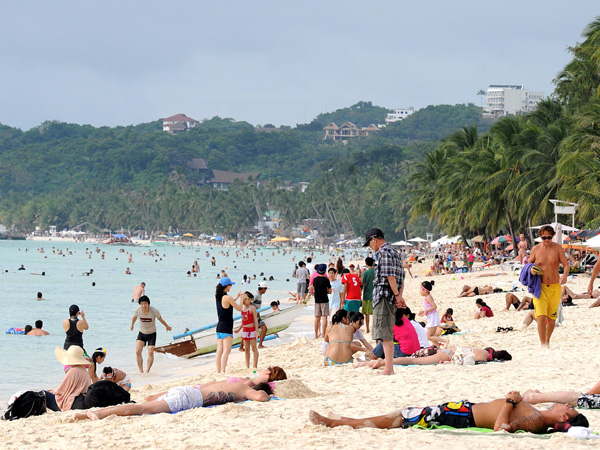The business community has mixed reactions about the temporary closure of Boracay, but some have said that it was about time the government did something to address the problem.
In separate interviews with the Inquirer, business groups expressed varying views on the issue.
Some were cautiously hopeful that a closure would be eventually good for the popular tourism spot. Others, however, have not yet come up with an official position on the divisive issue.
This developed as top government officials signed a recommendation dated March 22 for the six-month closure of Boracay from both local and foreign tourists starting April 26.
This is a shorter period compared to the earlier recommendation to close the island for a maximum of a year, which drew opposition from some sectors citing how it would lead to huge job losses.
The Management Association of the Philippines (MAP), which represents top officials in both local and multinational companies in the country, sees this as a tradeoff that would be beneficial in the long run.
“There is no question the tourism industry and its stakeholders will be dislocated by the total closure of Boracay. Jobs, livelihood and income will be lost,” said Eduardo Yap, Chairman of MAP National Issues Committee.
“But this will be temporary and should be viewed in the context of short-term pain for long-term sustainable gain,” he added.
He said Boracay would still be able to recover from this.
Nevertheless, he said that this should serve as a “wake-up call” to local governments to regulate development.
“In fact, other tourism sites being clearly developed beyond their carrying capacity must be included in the crackdown,” he added, citing Baguio and Tagaytay as examples.
It should still be done in phases
The Philippine Chamber of Commerce and Industry (PCCI), considered the largest business chamber in the country, reiterated its call for the rehabilitation to be done in phases, instead of a closure.
PCCI President Ma. Alegria Sibal-Limjoco said doing the rehabilitation in phases would “minimize the repercussion and disruption to the economic well-being of the various stakeholders.”
“We still believe that only those that are in violation of the environmental laws should be fined or closed as mandated by law,” she said.
Sibal-Limjoco said she hoped the government made a thorough study on the matter. If the plan pushes through, she said the country should be ready for the short term repercussions.
“But if we handle the communication correctly and promise a new and better Boracay, and we really have it in six months, then in the long term, we will all benefit,” she said.
The Makati Business Club and the European Chamber of Commerce of the Philippines (ECCP) do not yet have their positions on the issue, according to their top officials.
Wrong signals
Nevertheless, ECCP President Guenter Taus shared his personal view on the issue, noting that the island has worsened since the first time he saw Boracay 38 years ago.
“What happened between then and now? Irresponsible developments, illegal structures, imposition of environmental fees that were surely not used for that purpose, indiscriminate developments without any master plans (approved by the local government unit) in short, sanctioned largely by government – stretching over almost 4 decades – 4 decades of mismanagement and corruption,” he said in an e-mail.
While agreeing that action must be made, he was not quite sure what to expect after the six-month period, noting that the necessary improvements usually take more than that.
Instead, he said the government should hire a master planner for the job. For the meantime, tourist arrivals in Boracay could be narrowed down to avoid further damage. The actual mitigation should happen after the master plan.
“So what will we achieve by closing down for 6 months? Losing hundreds of thousands of jobs and getting establishments into bankruptcy, adding insult to our already tarnished reputation on the International Tourism stage even more?” Taus said.
“It would be sending the wrong signals to close down the Island and cancel hundreds of thousands of reservations,” he concluded.
